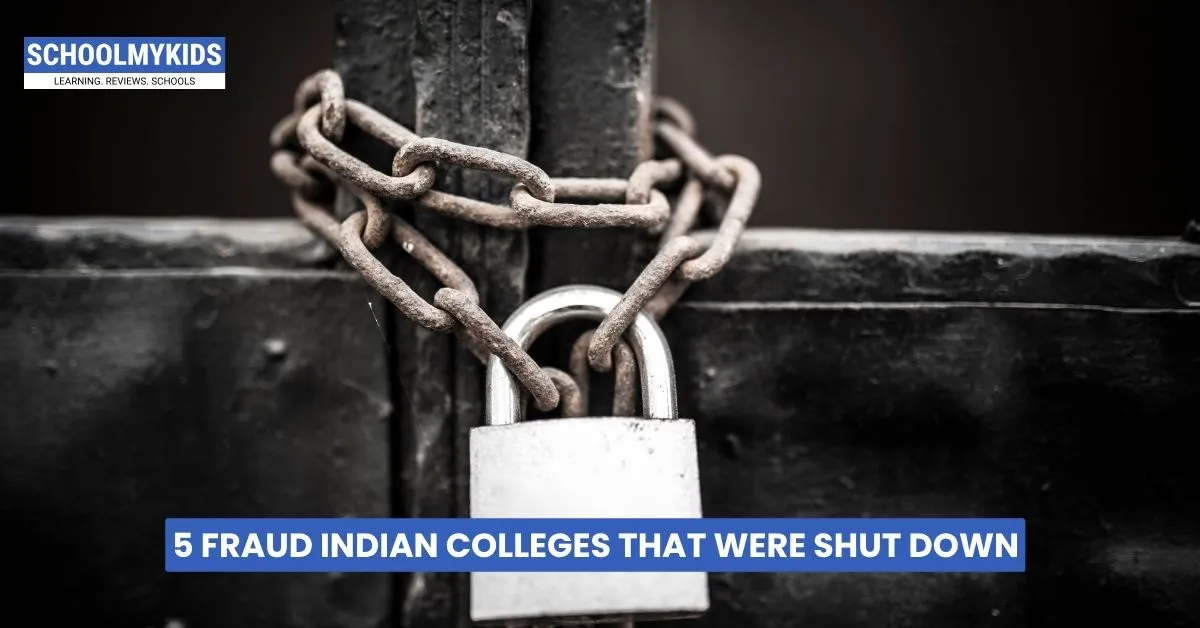In the vast and complex landscape of Indian higher education, there exists a clear distinction between a substandard college and an outright fraudulent one. While the former fails in its quality of education, the latter operates on a foundation of pure deceit, luring students with false promises of recognised degrees and a legitimate future. The University Grants Commission (UGC) and other regulatory bodies are in a constant battle against these "degree mills."
Over the years, several such fraudulent institutions have grown to a significant scale, duping thousands of students before facing the force of the law. Their eventual shutdown serves as a powerful and necessary cautionary tale for every student and parent. Here are five prominent examples of fraudulent Indian institutions that were ultimately shut down.
1. Indian Institute of Planning and Management (IIPM)
The Deception
Perhaps the most high-profile case of educational misrepresentation in India, IIPM ran a massive, nationwide operation for years. It used aggressive, full-page newspaper advertisements and celebrity endorsements to project itself as a world-class B-School, often implying equivalence with the IIMs. However, IIPM was never recognised by the UGC or AICTE to award MBA or BBA degrees. It was, in effect, an unaccredited entity selling its own certificates, which were often misunderstood by students to be valid degrees.
The Shutdown
After numerous complaints and legal challenges, the Delhi High Court delivered a landmark judgment in 2015. The court permanently restrained IIPM from offering any degree programs, including MBA and BBA, and barred it from using misleading terms like "management school" or "B-school." Following the verdict, which shattered its operational model, IIPM announced the closure of all its campuses across India, bringing an end to its controversial chapter.
2. CMJ University, Meghalaya
The Deception
Established as a private university in 2009, CMJ University in Meghalaya quickly devolved into a notorious degree mill. The fraud came to light when it was discovered that the university had awarded a staggering number of PhD degrees in a single academic year—over 430—in addition to thousands of other undergraduate and postgraduate degrees, all without the required faculty, research infrastructure, or academic rigour.
The Shutdown
The scale of the fraud prompted a swift and decisive response. In 2013, the then-Governor of Meghalaya, acting in his capacity as the university's Visitor, exposed the irregularities and recommended the immediate dissolution of the university. The state government acted on this recommendation, and after a prolonged legal battle, the Supreme Court of India in 2025 upheld the government's decision to shut down CMJ University for "mismanagement, maladministration, and fraudulent intent."
3. Eastern Institute for Integrated Learning in Management (EIILM) University, Sikkim
The Deception
EIILM University was a state-private university established in Sikkim. Its fraud was centred on illegal expansion. While it had approval to operate within Sikkim, it established hundreds of unauthorised off-campus study centres and franchises across the country. It enrolled thousands of students in these illegal centres and awarded them degrees, violating UGC norms, which prohibit state universities from operating beyond their territorial jurisdiction.
The Shutdown
Following numerous student complaints and legal challenges, the matter reached the Sikkim High Court, which declared the degrees awarded through these off-campus centres invalid. In 2015, based on the court's findings and a UGC fact-finding committee's report, the Government of Sikkim officially dissolved EIILM University. The UGC has since issued multiple public notices confirming its closure and cautioning students against it.
4. Manav Bharti University, Solan
The Deception
The case of Manav Bharti University represents one of the largest fake degree rackets uncovered in recent history. A special investigation team found that the Himachal Pradesh-based private university had sold tens of thousands of fake degrees over 11 years. The modus operandi was systemic, involving a network of agents who would find buyers, while officials at the university would tamper with records to issue back-dated degrees for a hefty price.
The Shutdown
Following police raids and the arrest of its main officials, the university's operations were brought to an effective halt. The Enforcement Directorate (ED) launched a money laundering probe, freezing assets worth crores. With its key functionaries declared as fugitive economic offenders and its degrees under investigation, the university has been functionally shut down. The UGC has placed it on a public watchlist, and its future is sealed pending the final outcome of the massive criminal investigation.
5. Institute of Alternative Medicines, Kolkata
The Deception
This Kolkata-based institution preyed on the growing interest in alternative therapies. For years, it featured prominently on the UGC's list of fake universities. It offered a range of unrecognised "degrees" and "diplomas" in fields like naturopathy, acupuncture, and reiki through distance learning, misleading aspirants into believing they were obtaining a valid medical qualification.
The Shutdown
As a non-recognised, self-styled entity, this institute was a prime example of a persistent fraudulent operation. After years of public notices from the UGC warning students against it, definitive legal action was taken. The Court of Metropolitan Magistrate in Kolkata passed an order permanently restraining the institute and its officials from awarding any degrees, effectively shutting down its primary fraudulent activity and providing a legal basis to halt its operations.
Conclusion: A Warning for Aspirants
The stories of these five institutions serve as a powerful warning to every student in India. Before enrolling in any college, especially a private one, it is imperative to verify its recognition status on the official websites of the UGC, AICTE, and other relevant statutory bodies. The shutdown of these colleges, while a victory for regulation, underscores the constant threat of fraud and the critical need for student vigilance.









Be the first one to comment on this story.